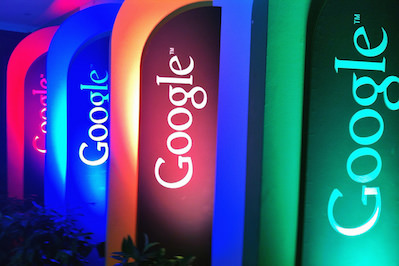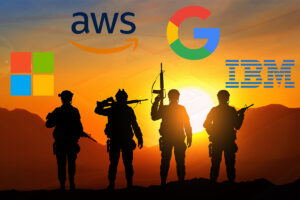Tech Giants Are Destroying Privacy, Producing Inequality and Undermining Democracy
Author Jonathan Taplin discusses how novelist Ayn Rand's cruel libertarianism has permeated Google, Amazon, Facebook and the White House. Jon Russell / CC BY-SA 2.0
Jon Russell / CC BY-SA 2.0
By Don Hazen / AlterNet
Most of us are active on Facebook, use many of Google’s assets (search, YouTube, calendar) and get Amazon products dropped at our doorsteps. But have we ever stopped to think about the enormous impact these three companies have had on our lives and our society?
Well, Jonathan Taplin has given it a lot of thought. The result is a breakthrough, must-read book, Move Fast and Break Things: How Facebook, Google and Amazon Cornered Culture and Undermined Democracy. The book tells the tale of how the internet “was hijacked by a small group of right-wing radicals [led by Trump supporter Peter Thiel] for whom the ideas of democracy and decentralization were an anathema.”
The upshot is that the dominant philosophy of Silicon Valley became heavily based on the radical libertarian ideology of Ayn Rand. The internet is not the product of any mythical cooperative notion as the public may think, shaped by the pervasive, effectively marketed illusion of goodness symbolized by Google’s tagline: “Don’t Be Evil” (changed to “Do the Right Thing” in 2015 in Google’s code of conduct).
The result: “Not since Rockefeller and J.P. Morgan has there been such a concentration of wealth and power” in the hands of so few, according to Taplin’s book. “And the enormous unprecedented fortunes created by the digital revolution have done much to increase inequality in America.”
The five largest firms in the world (based upon market valuation) are Apple, Google (now known as Alphabet), Microsoft, Amazon and Facebook. In terms of their monopoly power, Google has an 88 percent market share in search and search advertising. Google’s Android operating system has an 80 percent global market share in its category. Amazon has a 70 percent market share in ebooks, and 51 percent of goods purchased online are from Amazon. Facebook has a 77 percent share on mobile social media. Google and Facebook have more than one billion customers, and Amazon has 350 million.
As their “relentless pursuit of efficiency leads these companies to treat all media as commodity,” according to Taplin, “the real value lies in the gigabytes of personal data scraped from your profile as you pursue the latest music video, news article or listicle.”
The value amassed from their methods is enormous. Larry Page, Sergey Brin, Mark Zuckerberg and Jeff Bezos are in the top 10 of the wealthiest people in America, according to the Forbes 400 list. Each has a personal fortune worth over $37 billion, with Bezos recently becoming the second wealthiest person in the world with a net worth of $75.6 billion.
Jonathan Taplin is an insider/outsider in the music, film and tech businesses. His career stretches from his college days as a roadie and tour manager for The Band and Bob Dylan, to a collaborator and producer of music, film and TV for 30 years, working with Martin Scorsese, among others. He started his own tech business only to run up against many of the realities he describes in his book. He has been a longtime professor and is currently director emeritus of the Annenberg Innovation Lab at the University of Southern California.
Taplin’s book is a tour de force—a compelling, story-driven work focusing on the handful of men who have shaped and essentially taken over the massive tech industry. Along the way, Taplin tells his own personal story with charm and insight. If you want to understand what has happened to our country and where tech will take us in the era of Trump, put aside some time to read this book. It will take your breath away.
Taplin and I spoke by phone in early April.
Don Hazen: Do you agree with me that your story about the dominance of antidemocratic, monopoly-oriented, radical libertarianism values of the titans of technology is not well known? And if so, why?
Jonathan Taplan: I totally agree it’s not well known. The reason is because the tech barons, who are the new robber barons, have done a PR job on America that has been very successful… The strange thing is that the one guy who was not a libertarian, Steve Jobs, probably did more to raise the halo effect of tech than anybody.
He is the one guy whose company respected copyright. In a regular speech I give, I point out that a musician who got a million downloads of one song on iTunes would make $900,000; and if they got a million downloads on YouTube (owned by Google) they’d make $900.
DH: Wow, that’s really depressing. Another aspect could be that most of us use Google and Facebook all the time. We want these companies to be benign in our lives, right? We don’t want to deal with the fact that they are both destructive and convenient.
JT: Well, it seems like it has no cost, but that of course isn’t true. It has many costs. Obviously, fake news could not exist without Google and Facebook. A kid in Macedonia with a Facebook page and a Google AdSense account could make $10,000 a week just putting out phony stuff.
That could never happen if you didn’t have these open platforms. Also, we all pay more because advertisers have to pay a premium to buy ads on Facebook and Google, because they’re what they call micro-targeted. An advertiser says, “I want women in the Nashville metro area who drink bourbon and drive trucks,” and Facebook can do that.
DH: We can even do that at AlterNet—we call it geo-targeting. We’re a progressive nonprofit that’s dependent on Google for close to half of our revenue.
JT: Yeah. Well, there’s no place else to go.
DH: That’s the definition of a monopoly, right?
JT: Yep.
DH: You say the real value in these companies and their profits lies in the gigabytes of personal data scraped from profiles as you pursue the latest music video, news article, etc. Can you say more about that? Are we fundamentally all being victimized? What are the ramifications?
JT: They are essentially monetizing your life, your desires, your dreams, whatever, and you’re not really getting any advantage for that monetization; they are. Certainly the people who make the content, whether it’s AlterNet or most other content makers, are not getting much advantage considering the size of your audience… You are on the bottom end of the food chain in terms of where the advertising dollars flow.
For most it feels like, Oh, well, I’m just exchanging all in my life in return for convenience. That isn’t to say you couldn’t have convenience if there were more players in the marketplace. There’s nothing implicit about having one social network and one search engine.
DH: Peter Thiel is the chief villain of your book. He is a very powerful Silicon Valley radical libertarian, who started PayPal, is on the board of Facebook, and is a mentor and funder of what is sometimes called the PayPal mafia—many who have gone on to start other big successes like LinkedIn. Some of what he says is pretty scary, like: “I no longer believe that freedom and democracy are compatible.” What’s the path forward for Peter Thiel? Is his influence growing?
JT: His influence since I wrote the book has grown immensely, because he’s Jared Kushner’s best friend and he’s inside the White House and Donald Trump is holding his hand. He has extraordinary power in the White House in terms of determining technology policy. In fact, there’s even some rumors that Trump’s second Supreme Court appointment would be Peter Thiel.
DH: Oh my god, I didn’t hear that. Kushner has always been a moderate Democrat. How does he become so simpatico with somebody like Thiel, who is so right wing?
JT: Here’s the deal. These people in Silicon Valley have been able to put a Svengali move on the Democrats just as much as they put on the Republicans. Obama was under the spell of Google more than anybody I know about. Eric Schmidt [executive chairman of Alphabet] visited the White House by a factor of five more than any other CEO, and that’s just the official stuff that was written down at the White House gate.
DH: You mention the fact that Sean Parker, Larry Page and I think Thiel all went to the secret meeting of Republicans too, so they’ve got all the bases covered at Google?
JT: They don’t have any political affiliation whatsoever. They may pretend that they’re liberals, but they’re perfectly happy to be conservatives. In fact, one of the stories I tell in the book is that when the conservatives and Fox News and Rush Limbaugh were pounding on Facebook that their trending topics thing was being slanted against conservative media because the kids who were running it, who were the curators, were too liberal, Zuckerberg said, “Okay, well, I’m getting rid of the kids.” He fired them all and he just let the algorithm determine what got into trending topics.
Which was exactly what Steve Bannon and Cambridge Analytica wanted, because then they could play the algorithm with their armies of bots that they deployed, and completely push anything up trending topics that they wanted to.
DH: Further on in the book, you give Zuckerberg a bit of an optimistic pass in terms of hoping or thinking that he really cares about the four billion people who are not on the internet. He’s not at the same level as Page and Thiel and Parker?
JT: I don’t know. I probably would say that Bill Gates’ wife, Melinda, had more to do with him changing his life than anything. My sense is that Zuckerberg’s wife [Priscilla Chan] is a deeply committed humanist. She was a teacher, and I think like any of these guys, there’s probably a little bit of a battle for his soul. The very fact that she convinced him to give away 99 percent of their Facebook stock to a charity, even though it’s kind of a weird charity organization that he controls, is something.
It’s certainly not what Larry Page or Peter Thiel are doing. They’re giving money to organizations so they can live to 150 years old.
DH: We’re going to save that part until the end, because going to Mars and living forever is a whole final question about what makes these guys tick. Before we get there, let’s go backwards to Ayn Rand. When we were in college, these were crackpot theories, and we always thought they were books that kids read in high school or maybe as sophomores in college, and then we all grew up. Peter Thiel, who is apparently one of the smartest guys in the world, seems to worship the Ayn Rand narrative. What is that about?
JT: You know, it mystifies me so much. Paul Ryan and Donald Trump have both cited Ayn Rand as major influences on their life. My guess is it appeals to a certain kind of man who believes that he is better than most people, and he’s not appreciated.
If you look at those Ayn Rand heroes, they always thought that the average citizen was a total dunce, and that democracy wasn’t a good idea, and that really things had to be run by men of iron will who had no sense of responsibility for other people, just for themselves. They were the kind of people [who would ask], the line that she used is, “Who will stop me?” It’s that kind of pushing, that “I’m going to just forge ahead,” and it’s the will of the power. Like all that stuff we studied about Nietzsche in Princeton probably.
DH: Thiel also said he was for Trump because he would discipline the unthinking demos, the democratic public that constrains capitalism. That’s pretty scary as well. Do we think Trump understands that?
JT: Well, look, I think that they believe capitalism works best when there’s no rules, and they tend to think that the people who want to try and make rules for capitalism don’t understand it, and so they’re going to just screw it up. What Trump is doing right now is trying to get rid of every regulation, whether it’s environmental or internet privacy or anything you can imagine. He just wants to get rid of all these regulations, because he wants Verizon or Google or Exxon or Koch Industries to be able to just do whatever they want to do and not worry about regulation.
Of course, I think that’s what leads to things like the financial crisis in 2008, when the banks had no regulation and they just went crazy.
DH: Speaking of deregulation, you write about a New York Times article on a World Bank report that says internet innovation stands to widen inequality, and even hasten the hollowing out of the middle class. How does this happen?
JT: Well, first place, tech delivers extraordinary monetary returns to a very small group of people. The biggest tech company is employing 20,000-30,000 people, compared to, say, an auto company or General Electric that employs hundreds of thousands. That’s the first thing.
Secondly, it delivers returns to the highest level of those executives of those companies on such a level that Zuckerberg is worth $58.6 billion (fifth richest person in the world), that Bezos is worth $80 billion. In other words, if you’re at the top, your wealth is so great that it inevitably leads to inequality, because what tech does also obviously is eliminate a lot of working-class jobs. The better Elon Musk gets at making his cars, the fewer people he has to hire. He lets the robots do it.
DH: Apparently, according to Capital and Main, the workers at Tesla are not very happy either.
JT: I bet they aren’t.
DH: It was lovely to read in your book about The Band, Bob Dylan, Music from Big Pink and Woodstock, the story of your early days of rock ‘n’ roll, when you began to understand how this digital music system worked. It’s a sad story, because it ends up with Levon Helm, a member of The Band, dying of throat cancer and not being able to make any money because he couldn’t go on the road. Performers didn’t really have anyone protecting them like writers who had ASCAP and BMI.
Of course, behind this is Sean Parker, the king of digital destruction. Can you juxtapose for a moment Sean Parker and Levon Helm and what happened?
JT: Right. Sean Parker was kind of a bratty kid who got into trouble for doing hacking, and while he was on probation, he met another guy who was named Shawn Fanning, and they invented Napster. Their thought was, Well, look at all these tunes [that] are digital now that the CD is out, and what we need to do is build this service that allows anybody to share their music with anybody else for free; what we need to do is just index it.
That’s what they did. Of course, not being musicians, at first they had no idea that it would destroy the music business. And when they fairly quickly got the idea that it was destroying the music business, they didn’t give a f**k. What they cared for was to build this business, which they did to about 70 million users in two years. Once people got a taste of getting music for free, then that made it seem like all music should be free.
Same thing happened in the newspaper business. Once people got a little free news, then why should they pay for news? Why should I buy a newspaper? Newspaper revenues and music revenues plunged by 70 percent from the year 2001 until 2015. That’s just extraordinary, the business cut by two-thirds. I think that what happened is obviously Levon could no longer make a living off of the music, even though if you went to YouTube, the number of plays of “The Night They Drove Old Dixie Down” was in the millions; but he wasn’t getting any money from that.
That’s the sad story, and it’s not just Levon. There’s thousands of musicians. T-Bone Burnett and I do a talk every once in a while, and we run into just hundreds of musicians who can’t make a living anymore.
DH: What does it mean, what you describe as the surveillance marketing business? You say that both Facebook and Google are in this business now.
JT: Their main business is what I’ve begun to call surveillance capitalism. Basically, it’s a new kind of capitalism, which means that the greatest value that I hold is the amount of data that I have been able to sweep up from every possible realm on you, Don Hazen. I’m going to get it from your mobile phone, from your shopping online, from your location, from in your home if you have an Amazon Alexa, with the microphone on. I’m going to vacuum it up from there. I’m going to basically look for more places where I can grab your data.
The key to doing that of course is to get you to go on my services, whether it’s YouTube or search or on Facebook, and stay there as long as possible, and the more you stay there, the more data I’m grabbing from you. Now, I take that data, and I sell it back to advertisers in a way of being able to target a very narrow page of just who I want to get to. And it is not just companies that do that. Politicians, as we saw in the past election, can do that just as easily. If you want to suppress the vote among young black men in Detroit, it’s very easy to just send to them a piece of content that says, “Hillary Clinton says all young black men are predators.” You can be assured that that will be somewhat successful.
DH: How did the $84 billion Koch brothers get into your book about tech monopolies?
JT: Because they provided, through ALEC and the other organizations that they finance, the underlying power in Washington, D.C., to make sure that companies don’t get regulated. If you think about some of the problems that Trump is having now, these guys thought that the Republican health care bill was too much regulation in it, and so they offered basically a bounty to any of the Freedom Caucus who would vote against it.
They said, “We’ll put up to $2 million in ad money for your campaign if Trump comes after you.” Basically, these people have so much money, they’re just… basically the Peter Thiels and Larry Pages have just kind of surfed behind their propaganda, which says the market is always right, and the government is always wrong. When the government tried to do a few things to regulate Google, they come down on the government like a ton of bricks. Why do you think this internet privacy law was passed so quickly? Because the Koch brothers said it was fine.
DH: This question has to do with what you mentioned earlier about outsized imaginations. Musk is spending hundreds of millions of dollars to go to Mars, and Page and Thiel are investing as many millions to extend their lives. What does this tell us about these guys?
JT: It just seems so bizarre to me that we haven’t solved malaria or typhoid or cholera, and these guys are spending millions of dollars so they personally can live to be 200 years old. Now, to my mind the whole idea is insane because I would imagine by the time you were 130, you had spent four or five million to extend your life—because it’ll be expensive, and only the rich will be able to afford it—you’d be so afraid to come out of your house because you might get hit by a car and your whole $5 million investment would go down the tubes. It would seem to me you’d become a prisoner of your own longevity. I don’t know, but the whole thing is so screwy to me.
Elon Musk, at this conference that I went to that Vanity Fair put on, literally said, “We should set off a nuclear bomb on Mars, and it would melt the ice, and then we could grow vegetables to feed the colonies.”
DH: That’s wild. Really crazy. All right, anything else I should be asking you?
JT: I think you’ve covered it, man. I’m pleased that you liked the book.
DH: There is so much shocking and sobering information in your book that it should be required reading for everyone who wants to understand how we have arrived at this point in history, and the connections between tech monopoly, inequality and even Trump’s election.
JT: Sean Wilentz, a Princeton professor friend who runs the history department there, said, “Tap, you’re the new muckraker.” I said, “Well, that’s kind of cool.” Because in a sense, 100 years ago we had to face this same problem with Standard Oil and J.P. Morgan and the railroads. We’ve been here before. The 1912 election between Wilson and Teddy Roosevelt was run on [the question:] what do we do about monopolies? That was the main issue.
DH: Yes, but it is more difficult now because there’s no split in the ruling class. Obama was just as tight with Google as the Republicans, or more so. It was easier to scapegoat the railroads or Rockefeller and Standard Oil than it is to do the same thing to the guys wearing hoodies and sneakers, and saying, “We do no evil.”
JT: I know. I know. I will tell you, Don, that I think the dialogue is beginning to change. I was at a Chicago conference last week on monopoly, and it was at the Chicago School of Business, which is the most conservative, where Milton Friedman dominated. By the end of the conference even the old-fashioned Friedmanites were saying, “This surveillance capitalism is different, and we may have to rethink what we thought about regulation and monopoly.” I think something’s changing.
DH: The challenge is that many of us just don’t want to hear the reality about these companies because it makes our lives more uncomfortable, more challenging. Because we shouldn’t be doing half the stuff we’re doing, it’s just easier. We hang out on Facebook, give our information to Google, don’t take our money out of Merrill Lynch, Chase or Citibank. And often we don’t support local business—just have Amazon delivering those packages, helping make Bezos a gazillionaire, because it is easier to do. Anyway, congratulations on the book. I hope it is a big success.
Your support matters…Independent journalism is under threat and overshadowed by heavily funded mainstream media.
You can help level the playing field. Become a member.
Your tax-deductible contribution keeps us digging beneath the headlines to give you thought-provoking, investigative reporting and analysis that unearths what's really happening- without compromise.
Give today to support our courageous, independent journalists.









You need to be a supporter to comment.
There are currently no responses to this article.
Be the first to respond.